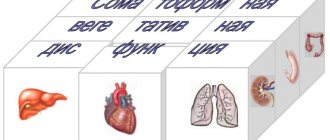Doctors at the Leto Mental Health Center observe various types of disorders. Among them is explosive psychopathy - a personality disorder that is manifested by ardor, short temper, conflict behavior and even aggressiveness. Such people literally suffer from themselves - they are aware of the inconvenience that arises because of them for those around them. If you find the same symptoms in your loved ones, call 8(969)060-93-93 , we will help you get rid of the pathology, and your loved ones will regain the joy of life.
Total information
The word “explosive” is borrowed from the English language - in translation “explosion” (pronounced “explosion”) means “explosion”. The character of the sufferer can really be called “explosive” - unpleasant symptoms arise suddenly. This is one of the most common types of psychopathy - a disorder, the essence of which psychologists convey in three words:
- disinhibition;
- courage;
- meanness.
It happens that you were suddenly attacked by a saleswoman at the market, or an opponent “drove” over you on social networks, although it seemed that you did nothing to provoke such a pronounced reaction. It is possible that these individuals suffer from the described disease. Thanks to many years of experience, our specialists are able to discern this pathology.
The aggression of people who have been diagnosed with this form of psycho-emotional disorders is forced to be tolerated by their environment. If they accidentally ended up in someone’s personal space, that’s not so bad; further communication can be avoided so as not to repeat the sad experience. But such individuals suffer from family members and other relatives, friends, work colleagues, neighbors - it is impossible or difficult for these categories to simply stop communicating due to life circumstances.
Causes
The immediate cause of explosive psychopathy is the characteristics of the central nervous system:
- congenital;
- acquired.
In the latter case, such “acquisition” is usually observed at an early age. Several forms of pathology have been identified:
- nuclear - appears against the background of human physiological characteristics;
- marginal - develops due to unfavorable external influences.
The causes of the nuclear form are:
- unfavorable heredity - usually this form of behavior is observed in other family members;
- disruption of pregnancy in the individual's mother;
- complex (often pathological) childbirth, during which it appeared;
- developmental disorders at an early age.
The causes of the marginal form of explosive psychopathy are:
- lack of proper education;
- regular conflicts between father and mother in front of the child;
- childhood psychotrauma;
- chronic long-term illnesses;
- traumatic brain injuries and their consequences.
To help such patients, we carefully study each case individually and take into account all the nuances. Our doctors believe that important causes of regional explosive psychopathy are also violation of the personal space of a child or adolescent, persecution by others, regular humiliation in the family and society, extremely gross suppression of the individual, and indifferent attitude towards minors. Although the disorder often arose in the opposite situation - in the case when the child was adored, indulged in every possible way, and did not prohibit any actions.
Typically, explosive psychopathy is identified with such features as:
- extroverted character type;
- explosive temperament;
- lack of self-control;
- stubbornness.
The sooner the atmosphere in which a child lives is normalized, the greater the chance that he will not suffer from explosive psychopathy. If, as he grows up, he is surrounded by restrained, wise, calm people, this is a favorable factor; thanks to it, an explosive child will grow into a person who will take care of the moral comfort of those around him.
The marginal form is easier and faster to correct, and we have extensive experience in its implementation. Disorders of behavioral reactions are less pronounced, the patient is more socially labile - ready to control his behavior and work on himself. The nuclear form has a less favorable prognosis.
Desire disorders - symptoms and treatment
Drive disorder (pathological drive, impulse control disorder, impulse control disorder) is a conscious need to perform any actions that are irrational and unnecessary in a given situation.
Attraction is an internal state that encourages one to behave in a certain way. Drive disorders include painfully heightened, perverted and impulsive drives that a person cannot help but follow.
There are several forms of this disorder:
- periodic agitation disorder —propensity to use violence;
- kleptomania - a constant desire to steal something;
- pyromania - desire to set fire;
- trichotillomania - a pathological desire to pull out hair;
- gambling addiction - attraction to gambling, etc.
The cause of impaired impulse control is unknown. There is an assumption that this disorder is caused by the interaction of all factors - psychodynamic, biological and psychosocial [8].
In understanding psychodynamic factors , according to Freud's theory, drive disorder is a violation of impulse control, in which there is a confrontation between the principles of pleasure and the principles of reality. For example, a kleptomaniac understands that it is impossible to steal, but he cannot deny himself the pleasure of stealing.
Some psychoanalysts emphasize the importance of fixation on the oral phase of development (from birth to one and a half years). Fixation means that an adult retains an unconscious memory of a specific mental trauma or an entire stage of development. During the oral period, the infant's survival depends on parental care, and the oral region is most strongly associated with the satisfaction of biological needs and pleasant sensations. According to Freud's postulate, a child who received excessive or understimulation in infancy is likely to become an oral-passive or oral-aggressive personality later in life. Such people expect a motherly attitude from the world around them; they are overly dependent and trusting, but they can also be cynical; they tend to dominate other people in order to satisfy their own needs. According to a common point of view, “atavisms” (features that rarely appear) of the oral phase can be traced in adults in addictions and habits (food cravings, alcoholism, tobacco smoking) [5].
A biological or organic factor often manifests itself in patients who use violence. A number of experiments have found that specific brain regions, such as the limbic system, are associated with impulsive and aggressive behavior, while other regions inhibit such behavior. In this regard, it has been suggested that the tendency to violence is associated with brain diseases. There is evidence of a connection between temporal lobe epilepsy and certain types of aggressive behavior. In addition, the presence of a history of head trauma, severe physical illness and other factors leading to brain disease in patients may be important [10]. Certain hormones, especially testosterone, have also been linked to violence. Congenital or acquired mental deficiency, epilepsy, hereditary predisposition and even reversible disorders of brain activity are factors in the development of impulse control disorder.
Of the psychosocial factors, events in early childhood are significant. If the parents themselves experienced problems with controlling impulses, if they did not fulfill their parental functions, then the child may have difficulties of the same kind. For example, this can happen to children from dysfunctional and single-parent families, where the mother cannot take care of herself and the child does not feel sufficient care. In addition, factors such as domestic violence, alcohol abuse and antisocial attitudes of parents have a strong influence [4].
In the question of which factor plays the leading role in each specific case, observations are important. Similar characters occur not only in parents and children, but also in close relatives. In this case, it cannot be said that the child “received” his character from his parents in the process of upbringing, because even if the child was raised in exceptionally favorable conditions, if there are hereditary prerequisites, there is a high probability of the formation of mental disorders [3].
Signs
The basic symptom of the described disorder is outbursts of anger. They:
- repetitive;
- uncontrolled;
- provoked by the slightest psycho-emotional stimuli.
Based on careful observation of patients, doctors at the Leto clinic believe that the effect of such irritants is just a formal reason for the appearance of rage; in fact, it can arise “out of nothing.” Typically, attacks of explosive psychopathy are preceded by banal everyday and work troubles:
- breakfast untimely prepared by the wife;
- a child's poor grade at school;
- subordinate being late for work;
- crowding on public transport and so on.
Ordinary ordinary situations cause aggression, projected onto others. The person himself points out what turned him on. But often there is no visible reason - the eruption of such an emotional “volcano” is possible against the background of complete well-being, in the absence of any provocative factors.
His relationships depend on how much the patient can control outbursts of anger:
- family;
- friendly;
- workers;
- social.
Many people find a personal way to calm themselves as soon as the first signs of an attack appear, and thanks to this they save their families, jobs, and so on. Others are unable to do this - not due to a lack of desire, but due to physiological deviations in the activity of the brain, due to which they are not able to adapt in society. Therefore they:
- often get married and divorced;
- change jobs regularly;
- can't make friends.
Such individuals with explosive psychopathy are often diagnosed with somatic diseases that arise from stress. This:
- peptic ulcer of the stomach and duodenum - the formation of one or more deep defects in the walls of these organs;
- myocardial infarction - necrosis of a fragment of the heart muscle, which develops against the background of a violation of its blood supply;
- Diabetes mellitus is a failure of carbohydrate metabolism due to a lack of the hormone insulin.
Therefore, if necessary, we involve related specialists if our patients need their consultation. We have huge long-term collegial connections with other clinics, and we treat not the disease, but the patient - this is precisely the postulate that is one of the most important in medicine.
Features of the flow
Symptoms of explosive psychopathy are observed already in childhood. The child is usually disobedient, unyielding, stubborn, and often conflicts with peers. Often he even uses physical force to defend his interests.
Patients in adulthood may be aware that they have abnormalities, but are unable to control them. They do not know how to regulate conflicts of varying degrees of severity, even if this is fraught with stress for themselves.
Explosive psychopathy is not a character trait, but a deviation. It must be combated, as it can cause serious administrative and criminal violations. Such people are capable of “getting excited” for literally a trifle.
What are psychopathy and what are their differences?
When meeting an unusual, unpleasant or frighteningly strange person, people are surprised or indignant, explaining the behavior of the interlocutor with poor upbringing, bad character or the whims of an egoist.
The impressions from such meetings will be so different that it is impossible to assume anything in common in the manifestations of the characters of completely different people. And yet there is a unifying principle for these situations. Its name is psychopathy.
Communication with a person suffering from such a personality disorder is not always unpleasant. Sometimes such people even evoke admiration and genuine interest. But life next to such an individual cannot be called calm and balanced. It is always an existence “on the edge”.
And on the verge of what - depends on the type of psychopathic disorder inherent in this or that problem person.
Biological and social causes of psychopathy
So what is psychopathy? Disease? Caprice? Bad character or the consequences of poor upbringing and environmental influences? There is some truth in all assumptions. But there is still debate about this type of “sickness of the soul” (this is how the term is translated from Greek).
There is no consensus yet on the causes of this condition and its varieties. Even the term “psychopathy” itself is not entirely unambiguous, which is not very good for trying to give an accurate definition of the phenomenon. This expression is quite often used to refer to various mental illnesses.
But other sources define psychopathy as a dissocial personality disorder.
Psychopathy can be classified as a so-called borderline condition.
This may also be a characterological deviation that interferes with the normal functioning of the individual in society, making a person’s behavior sometimes “strange” and sometimes simply unacceptable.
But close to this “border” are also progressive mental illnesses, such as Alzheimer’s disease. Although there are no signs of organic brain damage in psychopaths. They often display extremely high intelligence.
Maybe these are simply the consequences of the negative influence of external circumstances? Or was it his irresponsible and short-sighted upbringing that made him this way? One can partly agree with such statements.
Important factors for the development of psychopathy are indeed the negative (psychogenic) influence of the environment in which the individual developed and is located. In addition, there are no irreversible personality defects in people suffering from psychopathy.
If environmental conditions change to more favorable ones, their mental anomalies are smoothed out.
But there are also certain characteristics of the body that make it possible for the development of psychopathy.
There are three reasons for the occurrence of this pathological condition:
- In the presence of hereditary characteristics (biological factor), the emergence of nuclear or constitutional psychopathy can be assumed.
- Acquired organic deficiency can cause a condition called organic psychopathy (mosaic psychopathy). Life circumstances still play a significant role in this case.
- In the case when biological factors play a very small role in the formation of a personality disorder, we can say that marginal psychopathy occurs. The occurrence of psychopathy depends on the characteristics of the general life situation and psychogenic factors.
Is it possible to raise a psychopath?
Psychopathy is observed in every hundredth child
In young children, you can observe signs that portend the possibility of diagnosing psychopathy:
- Frequent quarrels and fights;
- Stealing or damaging things that belong to other people;
- The desire for constant “violation of prohibitions”, sometimes running away from home;
- Lack of guilt;
- Indifference to people's feelings and suffering;
- Spectacular display of emotions for the purpose of manipulation;
- Irresponsibility;
- Pathological desire for risk;
- Indifference to punishment;
- Extremely active desire for pleasure.
It will be difficult for such a child, and subsequently for an adult, to adapt to society. And here a lot depends on upbringing and the conditions surrounding a person. If life circumstances traumatize a growing person, this can lead to antisocial behavior in the person in the future.
A characteristic feature of psychopathy is the imbalance of the emotional and volitional spheres with complete intellectual integrity.
If favorable living conditions are created for a person with a similar illness, then his behavior will normalize. However, changes in behavior will not be the final “recovery.”
A person with such a state of mental health is always “on the edge.” At the slightest destabilizing situation, a breakdown is always possible.
What unites and what distinguishes manifestations of psychopathy
Individuals suffering from a psychopathic disorder, despite very obvious differences in behavior and character, exhibit common symptoms of this condition:
- Disharmonious behavior that is noticeable in all areas of life and relationships;
- Problems arise in childhood and then become fixed;
- Personality disorder causes deterioration in social and professional productivity;
- Conduct disorder causes distinct adjustment disorders and personal distress.
The final classification of conditions that are various manifestations of this “disease of the soul” has not yet been established.
Most sources identify the following main types of psychopathy:
- psychasthenic;
- asthenic;
- excitable (explosive);
- hysterical;
- paranoid;
- schizoid;
- epileptoid.
Psychasthenic psychopathy is characterized by a high level of anxiety, fearfulness and self-doubt, sensitivity to traumatic situations.
Asthenic psychopathy is manifested by increased timidity and shyness. Such people are extremely impressionable. They experience particular confusion when the environment changes, while acutely feeling their own inferiority.
Excitable psychopathy (explosive psychopathy) causes a person to show a very high degree of irritability, powerful outbursts of emotions, uncontrollable anger and rage. The personality experiences constant mental stress.
Hysterical psychopathy (hysterical psychopathy) is always an excessive demonstration of significance and superiority over others. Such people constantly act, they love external effects. This type of personality disorder sometimes makes a person prone to sexual perversion (sexual psychopathy).
Paranoid psychopathy. The main sign of this state is the desire to form “extra-valuable ideas.” Such people have rather narrow interests and thinking.
They are self-centered, suspicious and jealous. The passive-aggressive version of this disorder is manifested by a tendency to quarrelsomeness, intensified by the “struggle for the truth.”
This is a milder manifestation of paranoid psychopathy: psychopathy with a tendency to litigiousness.
Schizoid psychopathy causes people to consider themselves very sensitive and vulnerable. This does not prevent them from being emotionally limited despots, somewhat autistic and very pedantic.
Epileptoid psychopathy. The manifestations of this condition are similar to the characteristics of personality changes in epilepsy. A person is dominated by a melancholy and angry mood, explosiveness along with inertia of thinking. Irritation is constantly present in behavior.
Source: https://7psihozov.ru/psixopatiya/vidy-i-klassifikaciya.html
Cost of services
| CONSULTATIONS OF SPECIALISTS | |
| Initial consultation with a psychiatrist (60 min.) | 6,000 rub. |
| Repeated consultation | 5,000 rub. |
| Consultation with a psychiatrist-narcologist (60 min.) | 5,000 rub. |
| Consultation with a psychologist | 3,500 rub. |
| Consultation with Gromova E.V. (50 minutes) | 12,000 rub. |
| PSYCHOTHERAPY | |
| Psychotherapy (session) | 7,000 rub. |
| Psychotherapy (5 sessions) | 30,000 rub. |
| Psychotherapy (10 sessions) | 60,000 rub. |
| Group psychotherapy (3-7 people) | 3,500 rub. |
| Psychotherapy session with E.V. Gromova (50 minutes) | 12,000 rub. |
This list does not contain all prices for services provided by our clinic. The full price list can be found on the “Prices” , or by calling: 8(969)060-93-93. Initial consultation is FREE!
Treatment
It is carried out with the assistance of psychotherapy. The task is quite complex because you have to influence:
- human value system;
- his life principles;
- ability to relate to others.
A patient with explosive type psychopathy must himself show a desire so that others do not suffer from his actions - otherwise it will be difficult to influence him. Usually they undergo group psychotherapy sessions, thanks to which they learn to behave with the environment in various situations. This skill is reinforced in individual lessons.
Drug treatment is also carried out. Are used:
- neuroleptics - to relieve agitation;
- sedatives;
- antidepressants - according to indications and other drugs.
Doctors at the Leto mental health center know how to help patients with explosive psychopathy. They use only proven treatment methods and are guided by the experience of colleagues - Russian and foreign. Call the phone number 8(969)060-93-93 - we will listen to you very carefully and help you overcome this unpleasant problem.
Treatment of psychopathy
Comprehensive treatment of psychopathy makes it possible to normalize the development of a child’s personality. Treatment depends on the type of psychopathy and the age of the patient.
There are contraindications. Specialist consultation is required. Photo: Poznyakov | Dreamstime.com \ Dreamstock.ru The people depicted in the photo are models, do not suffer from the diseases described and/or all similarities are excluded.
Related posts:
How to treat bedwetting in children, treatment in Saratov, Russia
Perinatal encephalopathy, consequences, treatment
Movement disorder syndromes (muscular dystonia, cerebral palsy)
ADHD in children: treatment, attention deficit hyperactivity disorder
Cerebrasthenic syndrome: treatment, symptoms in children, adults









